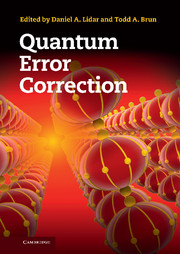Book contents
- Frontmatter
- Contents
- List of contributors
- Prologue
- Preface and guide to the reader
- Acknowledgements
- Part I Background
- 1 Introduction to decoherence and noise in open quantum systems
- 2 Introduction to quantum error correction
- 3 Introduction to decoherence-free subspaces and noiseless subsystems
- 4 Introduction to quantum dynamical decoupling
- 5 Introduction to quantum fault tolerance
- Part II Generalized approaches to quantum error correction
- Part III Advanced quantum codes
- Part IV Advanced dynamical decoupling
- Part V Alternative quantum computation approaches
- Part VI Topological methods
- Part VII Applications and implementations
- Part VIII Critical evaluation of fault tolerance
- References
- Index
2 - Introduction to quantum error correction
from Part I - Background
Published online by Cambridge University Press: 05 September 2013
- Frontmatter
- Contents
- List of contributors
- Prologue
- Preface and guide to the reader
- Acknowledgements
- Part I Background
- 1 Introduction to decoherence and noise in open quantum systems
- 2 Introduction to quantum error correction
- 3 Introduction to decoherence-free subspaces and noiseless subsystems
- 4 Introduction to quantum dynamical decoupling
- 5 Introduction to quantum fault tolerance
- Part II Generalized approaches to quantum error correction
- Part III Advanced quantum codes
- Part IV Advanced dynamical decoupling
- Part V Alternative quantum computation approaches
- Part VI Topological methods
- Part VII Applications and implementations
- Part VIII Critical evaluation of fault tolerance
- References
- Index
Summary
In Chapter 1 we saw that open quantum systems could interact with an environment and that this coupling could turn pure states into mixed states. This process will detrimentally impact any quantum computation, because it can lessen or destroy the interference effects that are vital to distinguishing a quantum computer from a classical computer. The problem of overcoming this effect is called the decoherence problem. Historically, the problem of overcoming decoherence was thought to be a major obstacle towards building a quantum computer. However, it was discovered that, under suitable conditions, the decoherence problem could be overcome. The main idea behind how this can be achieved is through the theory of quantum error correction (QEC). In this chapter we give an introduction into the way in which the decoherence problem can be overcome via the method of QEC. It is important to note that the scope of the introduction is not comprehensive, and focuses only on the basics of QEC without reference to the notion of fault-tolerant quantum computation, which is covered in Chapter 5. Quantum error correction should be thought of as a (major) tool in this larger theory of fault-tolerant quantum computing.
Information
- Type
- Chapter
- Information
- Quantum Error Correction , pp. 46 - 77Publisher: Cambridge University PressPrint publication year: 2013
Accessibility standard: Unknown
Why this information is here
This section outlines the accessibility features of this content - including support for screen readers, full keyboard navigation and high-contrast display options. This may not be relevant for you.Accessibility Information
- 1
- Cited by
